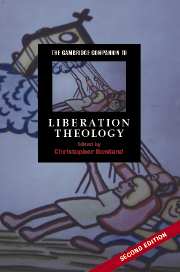Book contents
- Frontmatter
- Introduction: the theology of liberation
- Part I Contemporary Liberation Theology
- Part II Aspects of Liberation Theology
- 7 The origins and character of the base ecclesial community: a Brazilian perspective
- 8 The Bible and the poor: a new way of doing theology
- 9 Liberation and reconstruction: the unfinished agenda
- Part III Analysis and Criticism
- Epilogue: the future of liberation theology
- Select bibliography
- Index
- Series list
8 - The Bible andthe poor: a new way of doing theology
from Part II - Aspects of Liberation Theology
Published online by Cambridge University Press: 28 January 2008
- Frontmatter
- Introduction: the theology of liberation
- Part I Contemporary Liberation Theology
- Part II Aspects of Liberation Theology
- 7 The origins and character of the base ecclesial community: a Brazilian perspective
- 8 The Bible and the poor: a new way of doing theology
- 9 Liberation and reconstruction: the unfinished agenda
- Part III Analysis and Criticism
- Epilogue: the future of liberation theology
- Select bibliography
- Index
- Series list
Summary
The question of the relationship between socially engaged biblical scholars andordinary poor and marginalised readers of the Bible lies at the heart of thischapter. While it may seem strange to begin an essay on 'The Bible and the poor'with such a statement, liberation theologies in their various forms all emergefrom the interface between socially committed theologians and ordinary Christiansfrom poor and marginalised communities. The task of this chapter is to understandthe contours of the interface more clearly. As most of the readers of this volumeare probably from the First World, we must begin by making it quite clear thatliberation theologies are different from First World theology. It is not just thatliberation theologies have a different content, they are moreprofoundly different in that they have a different methodology.'The established methodology of First World theology - often regarded as auniversally valid norm - has recently been challenged. The challenge comes fromdifferent quarters in Africa, Asia, and Latin America, but it also comes fromcertain groups within the First World, e.g., from Christians within the feministand labour movements.'
Elaborating on this statement, Per Frostin defines the challenge posed bytheologies of liberation with reference to five interrelated emphases: the choiceof the interlocutors of theology, the perception of God, the social analysis ofconflicts, the choice of theological tools, and the relationship between theologyand praxis. Of particular concern in this chapter is the first of these emphases,what Frostin calls 'the interlocutors of theology', because it is this emphasisthat shapes each of the others.
- Type
- Chapter
- Information
- The Cambridge Companion to Liberation Theology , pp. 159 - 182Publisher: Cambridge University PressPrint publication year: 2007
- 1
- Cited by

